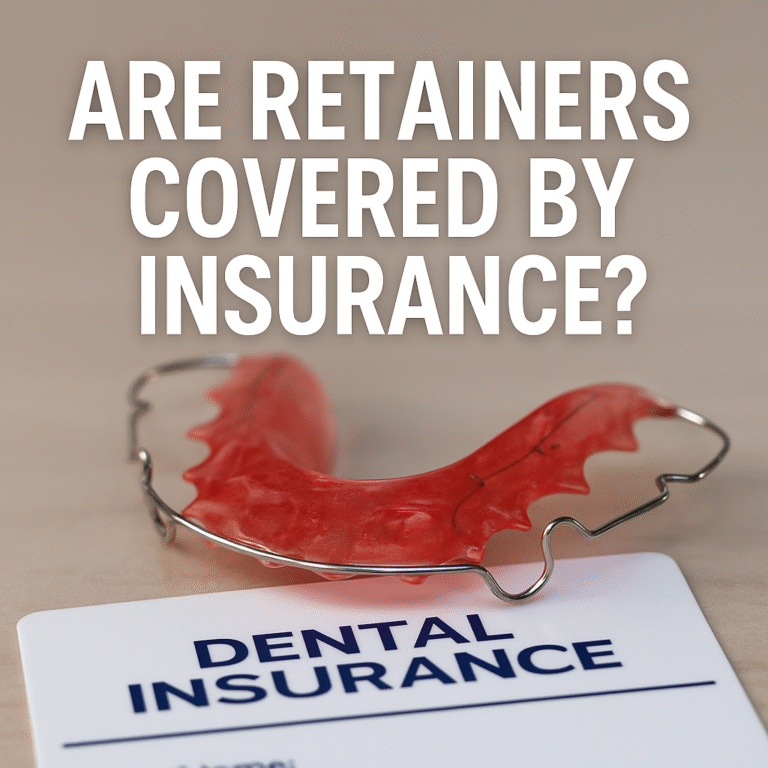Retainers play a crucial role in maintaining your perfect smile after braces. They help keep your teeth aligned and prevent costly orthodontic relapse. But here comes the million-dollar question: are retainers covered by insurance? The answer isn’t black and white. Understanding dental insurance policies can save you stress and money, especially when navigating post-braces care. In this comprehensive guide, we’ll walk you through what you need to know—clearly, positively, and backed by expert insight.
What Are Retainers and Why Are They Necessary?
Retainers are custom-made devices designed to hold your teeth in place after braces. They help stabilize your bite and prevent shifting. Without them, all the time and effort spent on orthodontic treatment could be lost. Whether it’s a fixed retainer bonded to the back of your teeth or a removable plastic model you wear at night, retainers are your long-term smile protectors.
How Dental Insurance Typically Works for Orthodontics
Most dental insurance plans separate coverage for orthodontics from general dental care. Orthodontic benefits often include braces and related services, but there are limits. Policies usually cover a percentage of the total cost (like 50%) up to a lifetime max. Some plans extend that coverage to retainers, especially if they are part of the initial treatment.
Are Retainers Usually Covered by Dental Insurance?
Yes, but only sometimes. Some insurance plans consider the cost of retainers part of the overall orthodontic treatment. This means they are covered if provided during or immediately after braces. However, replacement retainers or those not included in the original treatment might not be covered. Always review your Explanation of Benefits (EOB) or talk to your provider directly.
Types of Retainers and Their Insurance Eligibility
Not all retainers are created equal—and insurance companies know this.
Fixed Retainers: Often considered part of the braces package if installed right after treatment. Coverage may lapse for future repairs or replacements.
Removable Retainers: Usually covered if provided directly after treatment. Lost or damaged removable retainers may require out-of-pocket payment.
Replacement Retainers: Typically not covered unless your plan includes extended orthodontic care.
Key Factors That Affect Retainer Coverage
A few variables determine whether your dental insurance covers retainers:
- Timing: Retainers provided during active treatment are more likely to be covered.
- Treatment Plan: If the orthodontist includes retainers in the treatment estimate, the insurer may approve.
- Provider Network: Going in-network increases the chance of full or partial coverage.
- Billing Codes: Accurate coding (like CDT D8680 for orthodontic retention) is essential.
Top Dental Insurance Providers and Their Policies on Retainers
Insurance policies vary, but here’s how major providers stack up:
Delta Dental: Some plans cover retainers as part of initial treatment.
Cigna: Coverage depends on your specific policy. Orthodontic riders may help.
Aetna: Offers orthodontic add-ons that can include retainers.
MetLife: Limited retainer coverage post-braces. Best to verify.
UnitedHealthcare: May offer coverage through supplemental dental plans.
How to Check If Your Insurance Covers Retainers
Here are actionable steps to verify if your plan includes retainer coverage:
- Call your dental insurance provider and ask about orthodontic benefits.
- Check your plan’s Summary of Benefits and Coverage (SBC).
- Ask your orthodontist to provide a treatment estimate including retention.
- Request pre-authorization before getting a replacement retainer.
Alternatives If Insurance Doesn’t Cover Retainers
Even if your insurance doesn’t help, you have options:
- FSA or HSA: These accounts let you use tax-free dollars to pay for dental expenses.
- Retainer Subscription Services: Some companies offer ongoing replacement retainers for a monthly fee.
- Dental Discount Plans: These aren’t insurance but can reduce costs significantly.
- Payment Plans: Many orthodontists offer in-house financing options.
Tips to Maximize Dental Insurance for Retainer Costs
Maximizing your benefits means being proactive. Here’s how:
- Submit Claims Promptly: Delayed claims may be denied.
- Keep Records: Retain receipts, treatment plans, and any insurance communication.
- Bundle Treatments: Include retainer costs in your initial orthodontic quote.
- Use Annual Maximums Strategically: Schedule services across years if needed.
Legal and Billing Codes Used for Retainers
Insurance companies rely heavily on proper coding. Here are a few you should know:
- D8680: Orthodontic retention (removal of appliances, construction, and placement of retainer)
- D8692: Replacement of lost or broken retainer
Knowing these codes can improve your chance of claim approval.
Conclusion: Final Thoughts on Insurance and Retainers
Retainers are a key part of your orthodontic journey, and sometimes they are covered by insurance—but not always. Understanding the specifics of your plan, the timing of your treatment, and how your provider handles billing can save you hundreds of dollars. Always ask questions, get clarity, and explore alternatives if needed. Your smile deserves protection.
If you’re exploring other insurance-related topics, you might also be wondering how much is hydroxyzine without insurance or can you get evicted for not having renters insurance. These are equally important questions, especially in today’s complex insurance landscape.
FAQs About Are Retainers Covered by Insurance?
Do dental insurance plans cover retainers after braces?
It depends. If the retainer is part of your original orthodontic treatment, it’s often covered. However, replacement retainers or those requested later might not be.
Can I get a replacement retainer through insurance?
Sometimes. If your plan includes extended orthodontic care, you might qualify for a replacement. Otherwise, you may need to pay out of pocket.
What type of retainers are most commonly covered by insurance?
Removable retainers given immediately after braces are the most commonly covered. Fixed retainers might be included, but repairs often are not.
Is a permanent retainer covered by orthodontic insurance?
Only if it’s part of the initial treatment plan. Repairs or replacements for permanent retainers are rarely covered.
How much does a retainer cost with and without insurance?
With insurance, your cost may be minimal or even free if included in your treatment. Without insurance, retainers range from $150 to $600 each.
